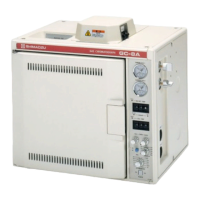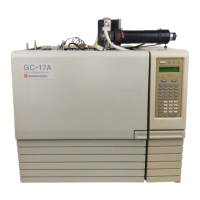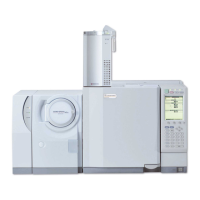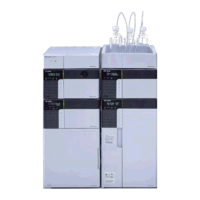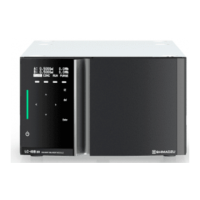Chapter 7 Troubleshooting
GC-2014 Service Manual
71
Chapter 7 Troubleshooting
When performing troubleshooting, first refer to the chapter on troubleshooting in the
instruction manual. This chapter mainly describes possible causes and countermeasures
not covered by the instruction manual. Refer to the item applicable to the symptoms
displayed by your instrument.
7.1 Gas and Pressure/Flowrate Settings
7.1.1 Precautions for Flowrate Control Settings (CAR)
7.1.1.1 When the [Control mode] is [SPLIT] or [SPLITLESS]:
(1) The total flowrate fluctuates (unstable).
Check that [I time] = "1", [P term] = "15", and [I term] = "40".
If not, enter these values and press the pf4 key to write them in the ROM.
Check for fluctuations in the cylinder's source pressure.
If the source pressure is shared (e.g., the helium carrier gas is used for the
detector's make-up gas and carrier gas), check for pressure fluctuations in
the other line.
(2) The total flowrate is lower than the setting.
Check whether or not the source pressure (i.e., the primary pressure) has
been attained.
The source pressure can be ascertained by viewing the [Actual] value for
the primary pressure in the [Flow Adjust] window. It is not necessary to
remove any piping.
Check whether or not the setting is within the range of settable
pressures/flowrates for AFCs. (A graph is given in the section on AFCs in
the GC-2014 instruction manual.)
Check that a blind has not been erroneously attached to a split vent and that
there is no clogging.
Check that [I time] = "1", [P term] = "15", and [I term] = "40".
If the values are different from the above values, enter these values and
press the pf4 key to write them in the ROM.
Check the [Offset] and [Gain] values for the flowrate.
The offset value is normally in the range 32,000 to 33,500 and the gain
value is normally in the range 3,000 to 6,000. If the offset value is well
outside this range, perform offset calibration. (The method is described in
the GC-2014 instruction manual.) If the gain value is well outside this range,
obtain the correct value from Shimadzu Corporation's Quality Assurance
Department. At this time, provide notification of the serial number and lot
number displayed on the side of the AFC.
Check that the status is not [Flow off] or [System off].
If 0 is displayed as the valve voltage, this indicates that there is no voltage
being supplied from the control system to the valve (TFC, Total Flow
Controller) that is attempting to supply carrier gas to INJ.

